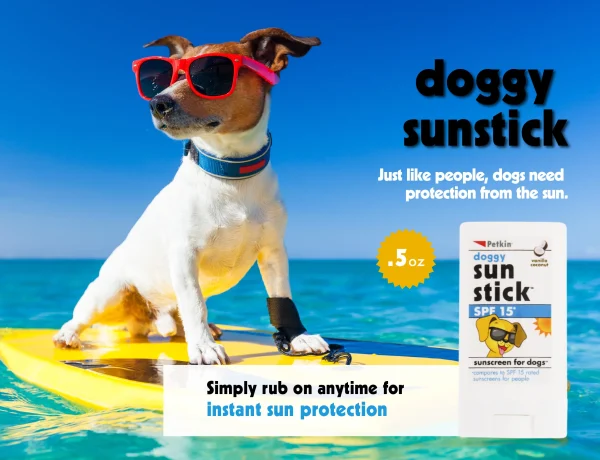Sunscreen for Dogs
When we think about sun protection, we often focus on ourselves, but did you know that our furry companions also need safeguarding from the sun’s harmful rays? Just like humans, dogs can suffer from sunburns and skin damage caused by exposure to ultraviolet (UV) radiation. Sunscreen for dogs is important because while some breeds are more susceptible than others, all dogs, regardless of their fur color or coat thickness, can benefit from the protection offered by sunscreen.
Understanding Dog Sunburn
Dogs with light-colored fur, thin coats, or short hair are particularly vulnerable to sunburn. Breeds like Dalmatians, Boxers, Bulldogs, and Pit Bulls are particularly susceptible to sun damage. Areas with less hair coverage, such as the nose, ears, belly, and groin, are especially prone to sun damage. Sunburn in dogs can cause redness, irritation, and even blistering, leading to discomfort and potential health issues.
Choosing the Right Sunscreen for Your Dog
When selecting a sunscreen for your furry friend, it’s essential to choose a product specifically formulated for canine use. Human sunscreen may contain ingredients that are harmful to dogs if ingested, so always opt for a pet-safe option. Look for sunscreens labeled as safe for dogs, preferably with ingredients like zinc oxide or titanium dioxide, which provide broad-spectrum protection against both UVA and UVB rays.
How to Apply Sunscreen to Your Dog
Applying sunscreen to your dog requires patience and care. Start by selecting a sunscreen with an appropriate SPF for your dog’s needs and skin sensitivity. Begin by testing a small amount of sunscreen on a small area of your dog’s skin to ensure they don’t have an adverse reaction.
Once you’ve confirmed that the sunscreen is safe for your furry friend, gently apply it to exposed areas of their skin, such as the nose, ears, belly, and groin. Be sure to massage the sunscreen into their fur, focusing on areas with less hair coverage. If your dog has a thicker coat, consider parting the hair to ensure proper coverage of the skin beneath.
Sun Safety Tips for Dogs
In addition to using sunscreen, there are other steps you can take to protect your dog from the sun’s harmful effects:
1. Limit Outdoor Activities: Avoid prolonged sun exposure during the peak hours of 10 a.m. to 4 p.m. when the sun’s rays are strongest.
2. Provide Shade: Create shaded areas in your yard or bring along a portable sunshade when spending time outdoors with your dog.
3. Hydration is Key: Ensure your dog has access to plenty of fresh water to stay hydrated, especially on hot and sunny days.
4. Protective Clothing: Consider outfitting your dog in lightweight, breathable clothing designed to provide UV protection.
Our Top Sunscreen For Dogs
1. Epi-Pet Sun Protector Spray for Pets: This sunscreen is designed specifically for dogs and cats and offers broad-spectrum protection against UVA and UVB rays. It’s water-resistant and contains natural ingredients like micronized titanium dioxide and zinc oxide.
2. Petkin Doggy Sunmist Sunscreen Spray: This easy-to-use sunscreen spray is formulated for dogs and provides SPF 15 protection. It’s non-greasy, quick-drying, and safe for use on your pet’s nose, ears, belly, and other exposed areas.
3. Warren London Premium Dog Sunscreen: Warren London offers a premium sunscreen specially formulated for dogs. This sunscreen is enriched with natural ingredients like shea butter and vitamins to nourish and protect your dog’s skin from sun damage.
4. Vet’s Best Dog Sunscreen Spray: Vet’s Best offers a gentle and effective sunscreen spray for dogs. It’s formulated with natural ingredients like aloe vera and vitamin E to soothe and moisturize your pet’s skin while providing SPF 40 protection against the sun’s harmful rays.
5. Epi-Pet Sun Protector Sunscreen for Pets: Another option from Epi-Pet, this sunscreen is available in a lotion form for easy application. It’s non-greasy, fragrance-free, and suitable for dogs with sensitive skin. Plus, it’s water-resistant for added protection during outdoor activities.
Conclusion
Just like humans, dogs need protection from the sun to prevent sunburn and skin damage. By choosing a dog-friendly sunscreen and taking proactive measures to limit sun exposure, you can help keep your furry friend safe and comfortable all year round. So next time you head outside with your canine companion, don’t forget the sunscreen.


Leave a Reply